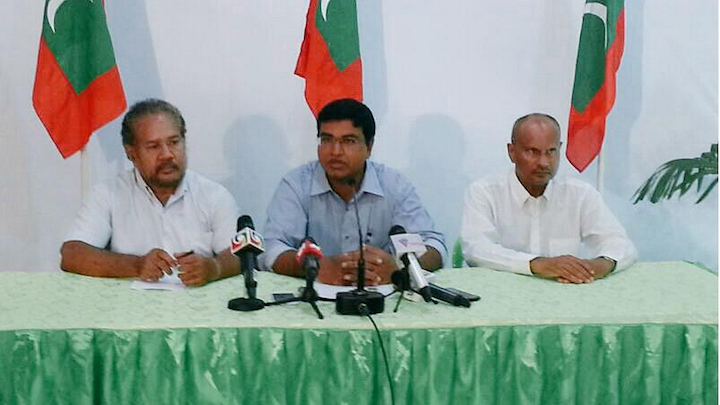“For normal children, the government provides free books and free education – doesn’t a child with a disability have the same right?” asks a tearful Aishath Hussein.
One of hundreds of people giving testimony to the Human Rights Commission of the Maldives’ (HRCM) “National Inquiry on Access to Education for Children with Disabilities” – Aishath is the primary caregiver for her eight-year-old autistic nephew.
She told the panel how she had to put her life on hold as she struggled to find a proper treatment and education for the him in the capital.
Fathmath Hussein, a mother to two autistic children aged thirteen and three-years-old, narrated the struggle she has gone through – describing under-resourced facilities and bureaucratic finger-pointing as her children struggle to claim their right to an education.
With state failure to provide necessary services, NGOs and private practices have taken up the responsibility, she told the inquiry – scheduled to finish today.
Private services are costly, however, with a single diagnostic assessment costing MVR5000 and an hour of therapy costing MVR500 – none of these services are covered by the ‘Aasandha’ universal health insurance program.
Fathimath explained how her elder son – who attended a standard international school abroad from grades 1- 3, studying thirteen subject and passing every single one of them with good grades – became isolated once the family returned to the Maldives.
The preschool currently attended by her younger son was said to have not only failed to provide him with any special attention, but according to Fathimath had not even provided basic services.
“I have seen other students pushing him around, poking him with pencils. But when I complain they say there are no trained teachers to take care of such children. He is very hyperactive,” she said, noting that at times teachers have made hurtful comments to him.
Shortly after Fathimath’s testimony, the parents of Yusuf – a child with partial hearing – explained how their hopes for his development were crushed by the unavailability of services.
“They cannot do a simple ABR test [Auditory Brainstem Response Test] here [in Maldives]. There is no speech therapy either,” she was told by authorities.
Another parent was concerned about the absence of any official policy, procedure, or guideline on access to special education at schools which claim they do not have enough space.
The National Inquiry
The HRCM inquiry is an open investigation to identify systemic issues in access to education for children with disabilities which hopes to find solutions through the engagement of state, public, civil society and experts.
Through it the commission will review existing practices, policies, laws and identify difficulties faced by parents and ways in which the rights of such children are being violated.
According to the HRCM, statistic from 2009 indicate that, out of 2250 children with disabilities, only 230 were attending schools at the time.
Inquiry teams led by the commission have travelled to 22 islands across 12 atolls in recent months, collecting nearly five hundred statements from parents, teachers, council members, and other stakeholders.
“It is an opportunity for the government, other state institutions and the public public to learn about their hardships. It is about listening and accepting without judgment,” said Mohamed Shihab, who was on the inquiry panel as an expert from the education field.
These are not just official statements and information, said Shihab, these are first hand accounts of their lives and personal experiences – their stories and their struggles.
Who is listening?
As the public hearings continue in Malé, frustrated and aggrieved parents, one after another, continued to pour out their concerns before the inquiry panel.
Aishath Hussein explained how she had to put her life on hold as she was still struggling to find a proper treatment and education for her nephew, Saif, in the capital.
Saif was recently brought to Malé by his father’s family after he went through traumatic experiences with his mother’s family, often being tied and locked up as family struggled to deal with his hyperactivity.
They brought him to Malé with hopes of providing better care. As Saif’s primary caregiver Aishath has tried to enrol him in a special educational needs class, to get treatments provided by NGOs and private practices, and to obtain the speech therapy recommended by doctors.
All her efforts have so far been in vain, however, with all the services unavailable or full. Even a doctors appointment at IGMH would have to wait another two months said Aishath.
“None of this is easy. I am not asking the government to send a doctor to our home. But at least when we go there provide us with some service,” she told the panel before breaking into tears.
If education is a universal right, why cant children like his brother get an education, she asked the panel.
“If you conduct programs like this, it should be accompanied by action. What we want is action, we want the same opportunities as other children. We don’t want them to be set aside just because they are children with disabilities,” she said.
Acknowledging Aishath’s statement, panelist Shihab expressed regret that state institutions and other invitees were “too busy” to be present and listen to her grievances.
The commission invited, among others, the Ministry of Education, the Ministry of Health and Gender, the City Council, MPs, MP-elects, the Maldives Police Service, the police commissioner, and senior members of these institutions.
None of these people or institutions have been represented at the hearings so far.
The public and media response to these open hearings was also weak, with HRCM Vice President Ahmed Tholal – an inquiry panelist – noting that people giving statements were discouraged by the absence of state institutions.
“The most important thing about this inquiry is sharing the voice of citizens directly with government and relevant authorities. They should at least listen. But now their concerns will be raised to the state through us,” he said.
In addition to other panelists, Tholal remarked that during their trips to atolls, council members, school management, the police, and other institutions were often present at the hearings – resulting in immediate action on some issues and discussion on others.
Systemic Issues
Concerns raised by hundreds of parents across the country were similar in many way, though – as with several other issues – things were worse for those living outside the capital and the other main islands.
At the Gaafaru public hearing a woman told the HRCM panel that her 12-year-old daughter, who has difficulties with hearing and speech, has been repeating classes as the school did not employ teaching methods appropriate for her.
Mariyam Liusha, a partially sighted nine-year-old from Kaashidhoo, is facing similar difficulties as her school has failed to provide her with larger prints of notes and exams, causing her to lose all interest in attending school.
As the Education Ministry policies do not allow special exams, children with disabilities are made to the same exams as others, explained Easa Rasheed, a leading teacher at Kaashidhoo School.
“We don’t have the budget or trained personnel. Bringing someone [trained] from Malé would cost at the least travel expenses, which could go up to MVR15000. Our budget allocations are very specific, and it does not include such expenses,” he said.
To provide an example of difficulties faced by schools, Easa explained the case of a student with a walking disability who the school is finding “difficult to accommodate”.
Easa said that failing to include these pupils in the school system resulted in many children with mental disorders ending up in the Home for People with Special Needs in Guraidhoo or in the Education and Training Center for Children in Maafushi.
“And those who grow up in the community become victims of harassment and bullying,” continued Easa, contending such attitudes have become part of the local culture.
In addition to public attitude towards children with disabilities, a lot of systemic issues were noticed during the inquiry.
“Children face incidents which would discourage them from attending schools and parents have to deal with extremely difficult procedures to get them into special education classes. Many parents are unaware of procedures to acquire the disability allowance. Children with mental disorders get labelled and are punished, making their conditions worse,” explained the HRCM’s Tholal.
HRCM Secretary General Shamun Hameed – also an inquiry panelist – said the biggest concern for him is the lack of a consolidated plan across the system.
“For instance, the Education Ministry has created SEN classes in some schools, but then doesn’t develop any further – and usually it is just a normal classroom. Lack of a [consolidated] plan makes all such efforts wasteful. Isolated action will be unsustainable,” Shamun said.
Results
Shamun assured that formulation of such a long-term master plan would be included in the inquiry’s final report. This, the end product of the inquiry, will highlight existing issues and propose recommendations for the state and other stakeholders.
A dedicated mechanism networked with civil society organisations – who also contributed to the inquiry- will then be established within the commission to monitor implementation of these recommendations.
According to Tholal, the HRCM will demand these be implemented through a publicised time-line with focused targets although some of the parents and observers at the hearings were skeptical of future action.
The commission on several occasions has accused the state of ignoring their recommendations, with panelists and concerned parents observing that state institutions are very defensive when approached concerning their failures, often choosing to play a “blame game” instead of taking responsibility.
One of the parents who spoke at the Malé public hearing said she did not have any faith in any state institution and did not expect them to take action.
“We as parents have proposed recommendations to state institutions so many times, but they never respond,” she said.
*Names have been changed to protect identities.
Likes (3)Dislikes
(3)Dislikes (0)
(0) 
